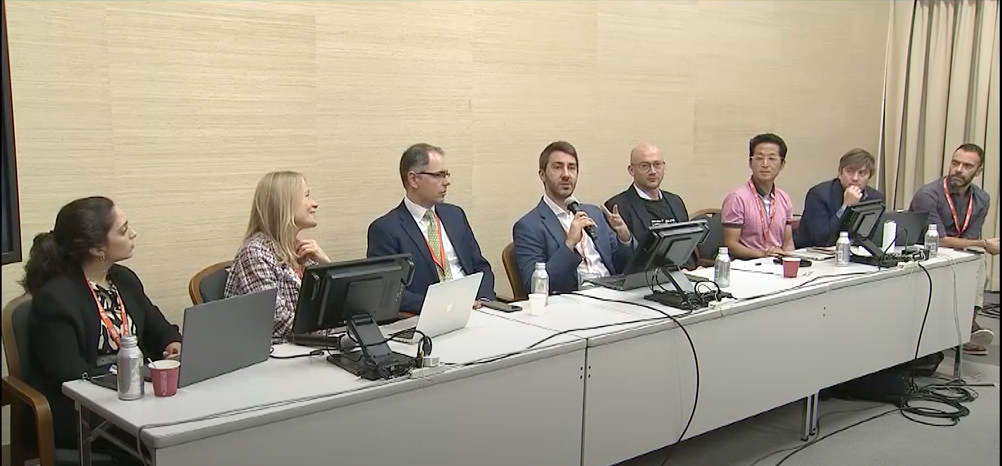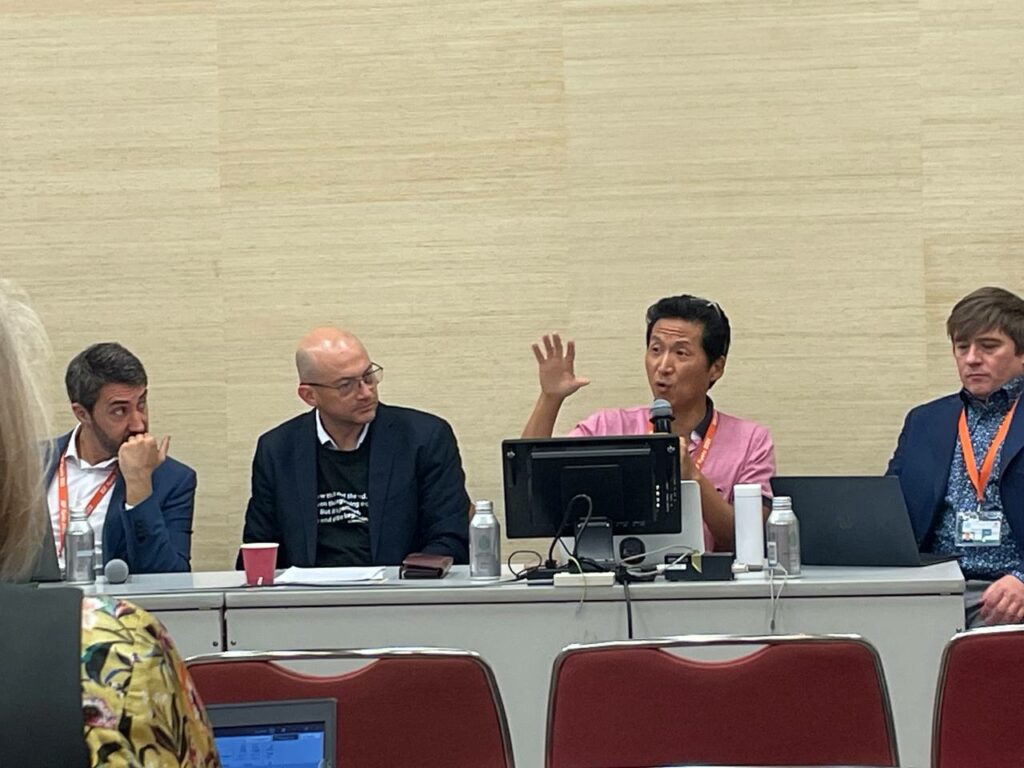Open Net co-hosted a Dynamic Coalition session on October 12, 2023 titled “(Un)fair Share Deal and Who Pays for the Internet?” to discuss the issues surrounding European Commission’s recent proposal to charge content providers fees for sending the data traffic. See here for full transcript and video.


Korean situation
K.S. Park started out by saying that the European Commission’s idea works like a tax on the Internet, taxation on speaking online. To speak online, you have to push out data onto the network. So, the more you speak, the more you have to pay somebody, just like to send a letter out, you have to buy a stamp and to make a phone call, you have to pay the telephone company.
In Korea, the rule was instituted only among ISPs in 2016, and using that as an excuse, the policymakers did not consult with the consumers and content providers. But the impact of that, of course, triggers down to content providers. Because ISPs hosting content popular providers will end up pushing out more data as users on other ISPs will want to access that popular content. Users accessing the content means data files made up of HTML will have to be pushed out to the users. That creates these incentives across the board on ISPs not to host popular content, or any content, and that basically removed the competition along ISPs in selling their services to content providers or hosting them on their network.
That has increased the Internet access fees relatively. You know that because of the technical advancement that Artur talked about, the Internet access fees are falling by 20% every year around the world. But in Korea, it didn’t happen. This relative increase continued for about ‑‑ the rule was instituted in 2016, and now it is almost seven years now. Over seven years ‑‑ well, actually, immediately, even in 2017, the Internet access fees, or in technical terms IP transit fees in South Korea was clocked at ‑‑ was measured to be eight times that of Paris, five or six times Los Angeles or New York. The trend worsened in 2021. Internet access fees, or IP transit fees, became 10 times Frankfort, 8 times London.
You can see this is a very hostile finance environment for start‑ups ‑‑ domestic start‑ups ‑‑ I say domestic because the domestic ones have to buy Internet access from local telecoms. In 2021, WATCHA, Korea’s answer to Netflix, the video streaming service ‑‑ was paying 10% of the revenue in Internet access fees. By 2020, even for public interest, COVID location announcement apps, the operator complained that because of high Internet transit fees, they cannot fully function and could not meet all the demand for information.
Overseas content providers also have a problem: because this disincentive from hosting popular content applies to overseas content hosted on cache servers on Korean ISP. As Artur talked about how data storage has been efficiently achieved and now the content is coming across the street through cache servers. So, a lot of content is being served through the cache servers on the network of the Korea ISPs, but hosting such cache server becomes costly to Korean ISPs because they have to bear the sender pay burden. So, they are charging increasingly essentially paid peering fees to overseas content cache servers.
So, Twitch, a popular gaming platform, they could not continue making the payment. They could do two things. They could charge the uploaders from Korea for uploading, right? Because it is usually them that upload content popular among Korea eyeballs and it is these contents generating more payment burden on Twitch. They couldn’t do that because making people pay is unpopular. Instead, they intentionally degraded the service. They lowered the resolution to 750, only in Korea, users are watching Twitch at a lower resolution than other countries. So, a lot of Korean users are leaving Twitch. Korea gaming videos will be watched more by Korean eyes so if Korea eyeballs are leaving, Korean gamers will leave too.
We can extrapolate that to Netflix. You know, the Squid Game is popular, yes, world popular, but but initially popular with the Koreans. So, if Netflix is required to pay Korean ISPs for accessing Squid Game, they will have to reduce investment in Korean-eyeball-heavy content. So, that is situation in Korea.
I hope you guys don’t learn the lesson, or learn the lesson, either way.
Freedom of interconnection v. net neutrality
I think one confusion on whether fair share deal violates Net Neutrality because of the presence of paid peering. Although it doesn’t account for a lot of connections as most of connections, more than 99.99%, are set on settlement-free peering, the small number of paid connections pass through a lot of traffic according to the French regulator ARCEP. FCC in the US, or BEREC, have not clearly said that net neutrality applies against paid peering.
Against that background, So, what TELCOS may be saying is that Fair Share Deal is paid peering, the fees that Google has paid Comcast and Netflix has paid Orange in the past. “This does not validate Net Neutrality.”
But what they are forgetting is that this will, number one, will not be enforceable. This is a MANDATORY paid peering. What has really supported the information revolution? Two rules. The Freedom to Connect at Net Neutrality, okay? So, Freedom to Connect and no freedom to charge for data delivery.
These two rules are actually the two sides of the same coin. It is because the network participant, the ISPs are bound to this rule that they cannot charge for data delivery but only for connection capacity, because of what Maarit called one‑sided obligation (although I don’t think it is obligation. It is more like exchange of promises between ISPs to sell this global product called the Internet to the world), that ISPs have the Freedom to Connect, or not connect. Network participants will be subject to this stringent net neutrality rule once they connect one another and therefore they should be given freedom to decide whether to connect.
If mandatory paid peering is enforced, what will happen? If Netflix and Google will say we don’t want to pay fees to access customers in your network, and just not connect. Eyeballs in your country will no longer access Google and Netflix. If all the content providers are burdened with the peering fees and therefore don’t connect, what are the regulators going to do? I mean, there is really not much you can do if you want to keep the Internet as it is. You will have to respect the freedom of interconnection.
I think it is unenforceable, and I think it is really pulling the rug under the fundamentals of the Internet architecture, which is the Freedom to Connect or Not Connect, and the removal of the data delivery fees.
Big ISPs’ motives: Korea Redux
Somebody said that the Korea market is profiting from the sender pay rule so they can afford the high 5G coverage 50%. The high coverage is only because Korea telcos are selling only with the 5G features, so consumers are forced to buy 5G phones. But the connectivity is so bad that there are consumers filing lawsuits against Korean telecoms right now, so bad that the 5G bandwidth has been taken away by the Government. So, no rose petal there.
This answers the question on whether the new revenues from the fair share deal will be used for modernizing, developing more network? I don’t think so. I mean, monopoly, when it becomes profitable, it becomes self‑perpetuating. They want more profit. History has shown that. In the Internet penetration rate of both Japan and Korea is at the top of the world but that is only about where the Internet is. In terms of connectivity, if you use ‑‑ I have never used WiFi this fast in Korea. The difference between Japan and Korea is that big ISPs in Korea are not participating in internet exchanges. There is no Internet exchange in Korea. All big telcos in Korea are all participating in Japan. Monopoly protected Korea’s sender pay rule has only perpetuated further monopolizing behavior of Korean telcos.
Maarit ETNO representative is talking about how ISP prices are falling, but the costs are falling too. The price of technology, putting together CAPEX and OPEX, the network maintenance and development costs have remained the same in the past five years while the traffic increased five times. The cost of delivery for unit of megabyte is definitely falling. Therefore, despite the increased traffic, the costs have remained the same. So even if the prices are falling per unit data delivered, the profits of European telcos have remained the same.
Finally, why are we talking about the falling revenues of telcos. when Google booted out Yahoo on the market, we never talked about what is fair and unfair, right? So, if it is so unprofitable that you cannot maintain cost, maybe we should talk about turning the telecoms into public utilities.
Organizers
Prof Luca Belli, FGV Law School, Rio de Janeiro
Speakers
- Kamila Kloc, acting director, digital decade and connectivity, DG CONNECT, European Union (TBC)
- Artur Coimbra, Member of the Board of ANATEL, Brazil
- Camila Leite, Brazilian Consumers Association (IDEC)
- Jean Jaques Sahel, Asia-Pacific Information policy lead and Global telecom policy lead,Google
- Maarit Palovirta Senior Director of Regulatory Affairs, ETNO
- Thomas Lohninger, Executive Director, Epicenter.works
- Konstantinos Komaitis, non-resident fellow, the Atlantic Council
- KS Park, Professor, Korea University
- About 30 people participated in the audience (about 1/3 female).
0 Comments